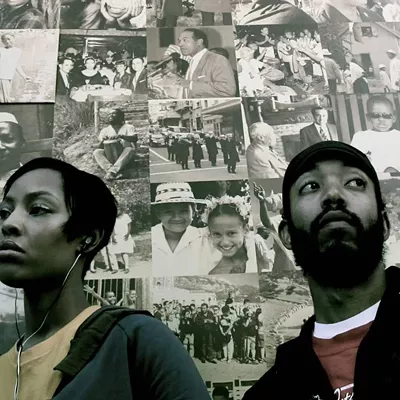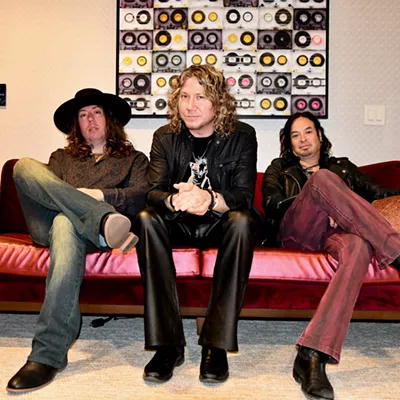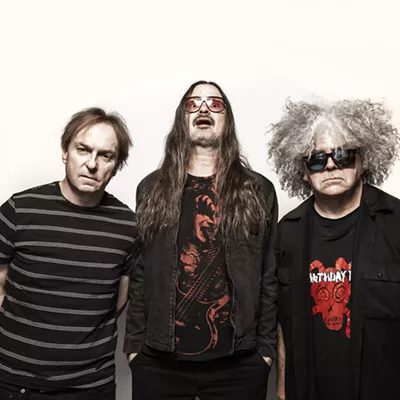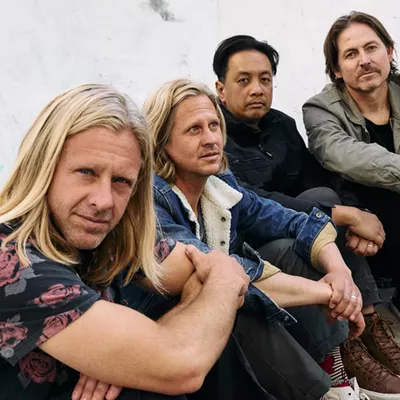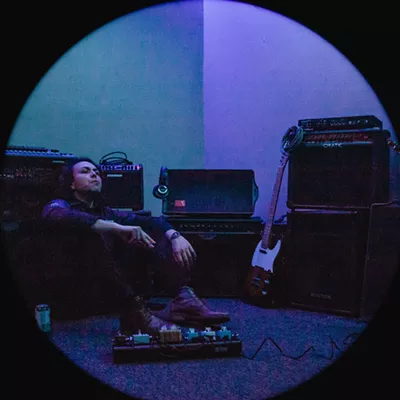After establishing himself as a formidable, unique singer/songwriter under the "Smog" banner for more than a decade, he suddenly added the superfluous punctuation a couple of albums back and went with "(Smog)."
Such a move shouldn't surprise anyone who's followed his career, as said career has largely relied upon an element of surprise. Callahan began home-recording and releasing cassettes of his lo-fi fantasies and, ostensibly, life documents back in 1988--rudimentary song fragments and tape collages that alternately comforted and jarred the listener into his insular world. Over the years, the only constant in his music has been that element of transport, though the songs have expanded their sonic palette and his universe has attained an expansive sense of clarity.
Drawing on themes including lust, love, revenge, obsession, fetish and the loneliness of the creative mind, Callahan imbues his private tales with a morbid dark humor. The most apt comparison to his morbid/hilarious combo is Morrissey. While the comparison might seem a stretch even to those familiar with his output, upon consideration, both tackle a world that can't understand them and the process of shrugging it all off for the benefit of experience--call it romanticism.
Trading in everything from glacially paced mopes to mid-tempo rockers and utilizing the familiar rock 'n' roll comfort zone of guitar, drums, bass and vocals, Callahan--in a flat, intimate voice that suggests Lou Reed's younger brother--lets off enough pathos to make tales of depravity sound utterly palatable. Often over hypnotizingly repetitive riffs--from Julius Caesar's "47 Pushups" through Supper's "Our Anniversary"--Callahan draws the listener into a world where things are just as complicated as they are in real life, only nobody is afraid to talk about those "anomalies" that make us all human.
A notoriously tough interview, Callahan recently answered some cyberquestions--in other words, it was done by e-mail--from Weekly contributor Brian Mock, about this year's (Smog) release, the aforementioned Supper, and his current tour, which will bring him to Tucson this week.
In the only manner about him that is predictable, his answers were cryptically unpredictable.
Tucson Weekly: Supper seems to have a lot more variation, in terms of instrumentation, than your last couple of records. Specifically, I'm referring to a few things: the vocal harmonizing with Sarabeth Tucek, the gritty-sounding guitar riffs on "Morality" and "Ambition," and the ethereal sound of "Driving." How much of this was your desire to try different approaches, and how much was a reflection of the players you chose to record with?
Bill Callahan: It would be my desire to try different approaches mostly. And the choice of player comes after that, i.e., "Who would be good for this based on what I know about this song so far?" Although it is often chaos or discomfort I am looking to draw from or place on the player. Choosing the player is only the next step; it is not the end of the process.
TW: This may sound really corny, but I have found that your songs can affect me in two different ways: If I'm depressed, I can really identify with your lyrics; and, if I'm in a good mood, your lyrics are hilarious. Is this your intention, in any way, when you write songs? Are these the states of mind in which you write?
BC: I'm not sure of any intentions. I like the idea of the music being flexible, from person to person, and even better if it has different meanings at different times for the same person. The state of mind in which I write, if I do in fact write, as it doesn't really feel like I write, is only described as "inspired." That is, inspired to live. It is a feeling like when you open up a car to 75 and the engine goes quiet, almost silent and your foot melts away.
TW: You've had different players on each of your records. Is this a conscious choice to keep things interesting, or a matter of who's available at the time?
BC: It's a choice to keep things interesting, to keep me and the others on our toes. I don't like familiarity of any kind.
TW: Jim White's drumming, to me, seems to really play well off your songs. (It reminds me of the feeling of the motion that a boat has right after the motor has been turned off.) Will you be bringing the same players from Supper on tour with you this summer?
BC: That image is nice. Recently I've been wondering if you would go insane if you lived by the ocean. It would be nice at first, but after 10 years, wouldn't the waves crashing just drive you insane? None of the Supper players will be on this tour. Here's what we're looking like: Rich Germer (guitar and comfortable shoes), Jason Dezember (drums and Old Navy shorts), Jiha Lee (keyboards, and I haven't met her yet, but hopefully bare feet).
TW: Finally, you, Will Oldham and Neil Hagerty all started out over a decade ago on the same label. Now, all three of you guys are still on Drag City and still putting out really good records. In an age when most musicians/songwriters are signed to labels to write hits, rather than develop a career, do you feel lucky to be able to do the latter? Do you feel camaraderie with those guys (Will and Neil)?
BC: Neil and Will are hells of guys. I did my first real tour with Neil in I think it was '92, so I have a special affection for him. That is the type of camaraderie I feel. I don't know if it is luck that brought me here. I think life is meant to be lived backwards--from "death" to "birth." So I was born with this knowledge and I am working backwards to rid myself of it. By living in a mirror. So I have always accepted and been aware of what I "am" (after shedding some bothersome youthful shackles).



